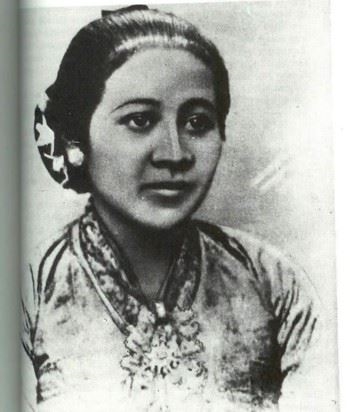Talking about heroes, you will think about those who have given you a lot of influences for the better. There are a lot of people who have given me many influences, but I wouldn't be like I am today if Indonesia didn’t have Raden Ajeng Kartini.
Raden Ajeng Kartini was born in an aristocratic family. Her father, Raden Mas Sosroningrat was a governor of Jepara, central Java. Until she was twelve years old, she was permitted to study in ELS (Europese Lagere School). But after that year, she had to be secluded because of the tradition. In that age, Javanese girls had to be secluded when of marriageable age.
In ELS, she learnt the Dutch language. Therefore, she could make correspondence with her friends in Dutch. One of her correspondence friends was Rosa Abendanon who supported her so much. From European books, magazines, and newspapers, Kartini was interested about the progress of European women. From that correspondence, she had an idea to make Indonesian women to go forward.
In that era Indonesian women didn’t have rights to speak, to get education, or to choose their own. Men had higher positions than women. And women had to obey men’s commands and the traditions, most of which made them suffer.
Kartini not only cared about the emancipation of women but also the social problems. The Dutch were taking over Indonesia. It made a lot of problems, such as starvation and poverty. She was concerned about her nationalism and how her country could get its own independence. Most of her letters showed us that she wanted Indonesian women to have freedom to get an education. She thought that Javanese cultures resisted allowing Indonesian women to go forward. Kartini wrote her ideas and her aims in her letters.
Kartini’s letters expressed that she needed help. In the letters to Estelle "Stella" Zeehandelaar, she expressed that she wanted to be like European young woman. She told Stella that Javanese women were restricted by Javanese culture so that they couldn’t get an education, had to be secluded when of marriageable age, and had to married to an unknown man.
Her parents ordered her to be married with the governor of Rembang, Rd. Adipati Joyodinigrat who had three wives before. Kartini got married on 12 November 1903. Her husband supported her and she got the freedom to establish a school for women. Her son, R.M. Soesalit, was born on 13 September 1904. Days later, Kartini died.
After Kartini died, Mr. J.H. Abendanon made her letters into a book. The title is "Door Duisternis tot Licht," which meant "After the dark there will be a light." It was published in 1911. Nowadays the letters have been published in many versions.
 |
| Thank You. You have made us smile. |
“I want …” that is a motto of Raden Ajeng Kartini. It represents to us that she who had never been seen, became a hero for all the people in Indonesia, or maybe the world. She can straighten out many things: social, culture, religion, even corrupt cases.
Nowadays Indonesian women can get their education, like she had wanted them to. However, although she wanted us to get our education; she wanted us to not forget our natural natures.
Page created on 11/6/2006 12:00:00 AM
Last edited 11/6/2006 12:00:00 AM
